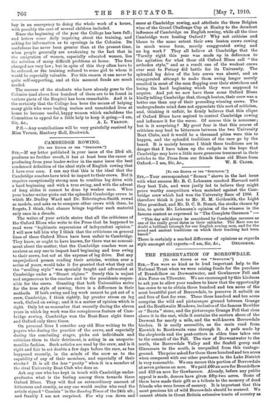CAMBRIDGE ROWING.
[To TER EDITOR OP TEE "SPECTATOR."] Sru,—If my letter published in your issue of the 23rd ult. produces no further result, it has at least been the cause of producing from your leader-writer in the same issue the best condensed definition of the ideal style of English rowing that I have ever seen. I can say that this is the ideal that the Cambridge coaches have tried to impart to their crews. But it requires exceptionally strong men to combine leg drive with a bard beginning and with a true swing, and with the advent of long slides it cannot be done by weaker men. When your leader-writer picks out the splendid Cambridge crews in which Mr. Dudley Ward and Dr. Etherington-Smith rowed as models, and asks us to compare other crews with them, he forgets, I think, that chance brings together such material only once in a decade.
The writer.of your article states that all the criticisms of the Oxford Blues who write to the Press that he happened to read were "legitimate expressions of independent opinion." I will now tell him why I think that the criticisms on general lines of these Oxford Blues have been unfair to Cambridge. They knew, or ought to have known, for there was no conceal- ment about the matter, that the Cambridge coaches were as anxious as any one to impart hard beginning and true swing to their crews, but not at the expense of leg drive. But any unprejudiced person reading their articles, written over a series of years, would take it for granted that what they call the "sculling style" was specially taught and advocated at Cambridge under a " Stuart regime." Surely this is unjust and ungenerous to the coaches and to the presidents respon- sible for the crews. Granting that both Universities strive for the true style of rowing, there is a difference in their methods. If both swing and leg work cannot be got out of a crew, Cambridge, I think rightly, lay greater stress on leg work, Oxford on swing; and it is a matter of opinion which is right. Only let us remember that recently during the eleven years in which leg work was the conspicuous feature of Cam- bridge rowing, Cambridge won the Boat-Race eight times and Oxford only three times.
On personal lines I consider any old Blue writing to the papers who during the practice of the crews, and especially during the concluding stages, picks out individuals and criticises them to their detriment, is acting in an unsports- manlike fashion. Such articles are read by the crew, and is it right and fair to set doubts a few days before the race, as has happened recently, in the minds of the crew as to the capability of any of their members, and especially of their stroke ? It is all the less " pretty " when it is a member of the rival University Boat Club who does so.
Ask any one who has kept in touch with Cambridge under- graduates what is the feeling among them towards these Oxford Blues. They will find an extraordinary amount of bitterness and enmity, as any one would realise who read the article signed " Camisis " in the Sunday Times of the 24th ult.; and frankly I am not surprised. For why run down and'
sneer at Cambridge rowing, and attribute the three Belgian wins of the Grand Challenge Cup at Henley to the decadent influence of Cambridge on English rowing, while all the time Cambridge were beating Oxford P Why not criticise and blame to the same extent their own beaten crews rowing in much worse form, merely exaggerated swing and no leg work P They all believe at Cambridge that the 'Varsity eight this year was made up in deference to the agitation for what these old Oxford Blues call " the orthodox style," and as a result one of the weakest crews ever sent to Putney did battle for its University. The splendid leg drive of the late crews was absent, and an exaggerated attempt to make them swing longer merely resulted in most of the men flopping over their stretchers and losing the hard beginning which they were supposed to acquire. And yet we now have these same Oxford Blues kindly telling Cambridge that, though beaten, their crew was a better one than any of their preceding winning crews. The undergraduate mind does not appreciate this sort of criticism, and, thinking it unfair, he firmly believes that this clique of Oxford Blues have aspired to control Cambridge rowing and influence it for the worse. Of course this is nonsense; but is it surprising P My great fear is that this course of criticism may lead to bitterness between the two University Boat Clubs, and it would be a thousand pities were this to happen, and the splendid traditions of the race go by the board. It is mainly because I think these traditions are in danger that I have taken up the cudgels in the hope that Cambridge may have a little more generous treatment in their articles to the Press from our friends those old Blues from










































 Previous page
Previous page